Do you have a furry friend at home in the form of a guinea pig? If so, you’re likely one of many pet parents who sometimes hear their cavy cough or make some strange noises.
While these noises may be cute and bring smiles to our faces, there are times when we need to worry about why our little companion is making such an odd noise. Understanding why do guinea pigs cough and recognizing the different types of coughs can help us better care for our pets and keep them healthy!
This blog post will dive into what causes coughing in guinea pigs, whether it’s due to sickness, being cold, or caused by something else entirely.
Tip: If you’re on the market for a cavy, check out this post about guinea pigs’ full size.
Why you shouldn’t ignore guinea pigs coughing
Unlike a guinea pig sneezing, which is normal, coughs aren’t typical for them. As such, you should keep your eyes and ears open for when they cough, keeping tabs on duration and frequency.
If the coughing persists, you’ll need to start looking at the different ways to help free your furry friend from the cough and prevent it.
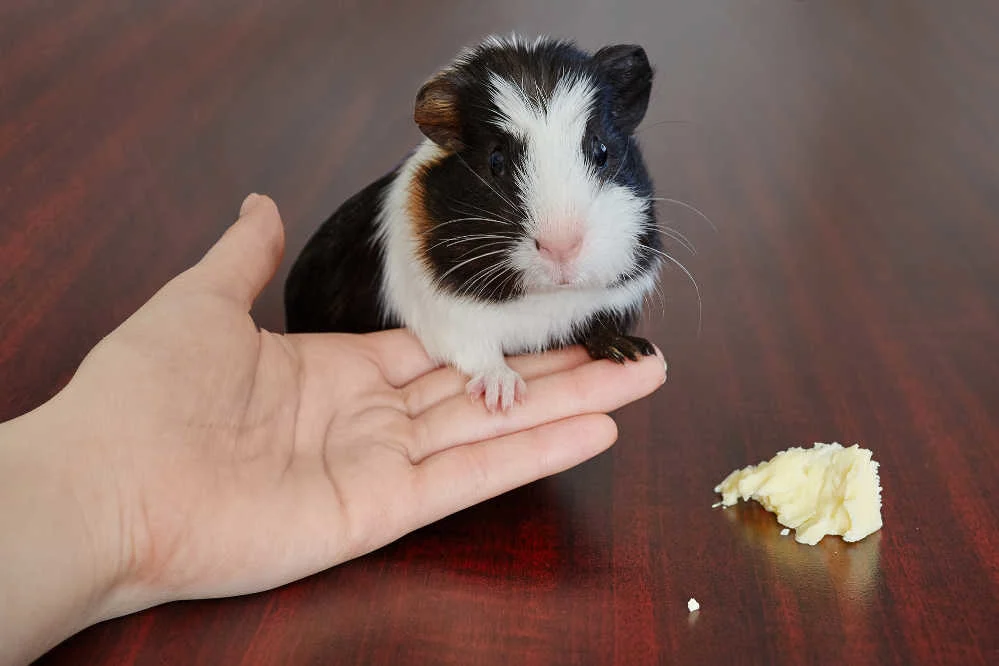
How often do guinea pigs cough?
Occasional coughs aren’t something to be concerned about regarding guinea pigs. These lovely critters will most likely offer a cough response once or twice a day, often when eating or drinking. Anything that’s more frequent or occurs outside of their feeding is an anomaly and a cause for concern.
What causes guinea pigs to cough?
While a chronic cough is something to be alarmed at, not every cough points to an illness. Like humans, guinea pigs cough for various reasons, some less serious than others.
1. Upper respiratory infections
According to one present study, the most common causes of a persistent cough in guinea pigs are respiratory infections caused by a bacterial infection like bordetella bronchiseptica. The study found that these infections irritate the guinea pig’s airways, prompting them to experience an excessive number of coughs.
Guinea pigs are quite vulnerable to upper respiratory infections, also known as URIs. An upper respiratory infection is one of the most common ways in which guinea pigs get sick.
These illnesses take a toll on the animal’s health and can be caused by many things. This ranges from the environment it is kept in to other guinea pigs it comes into contact with.
After all, these diseases are contagious and can spread with the slightest droplets — much like kennel cough in dogs.
2. Diagnosing an upper respiratory infection
If you suspect that an URI is the cause the illness, you can self-diagnose the issue, though a vet’s opinion is always the final say on the matter. There are various ways of doing so, including the following.
Listen to how your guinea pig breathes. If it’s breathing heavily or different from how they usually sound, there may be an issue. Just pick them up and place them by your ear. Try to keep your ears open for any wheezing and clicking sounds from their torso; these commonly indicate a URI.
Another common telltale sign that these lovely creatures are dealing with URIs is a loss of appetite. While coughing constantly, the throat can become painful and makes swallowing food hard.
Like us with our runny noses when sick, guinea pigs can develop something similar. As a result, you’ll need to observe their noses for any nasal discharge. A colored discharge, mostly yellow or green, represents an issue. The nose may also be dry, prompting scratching that leads to redness as they try to combat the itch.
Furthermore, the eyes can be an essential indicator of your furry friend’s health. In fact, URIs are the most common cause of eye infections. When sick, the eyes may have a yellowish colored discharge or develop inflammation.
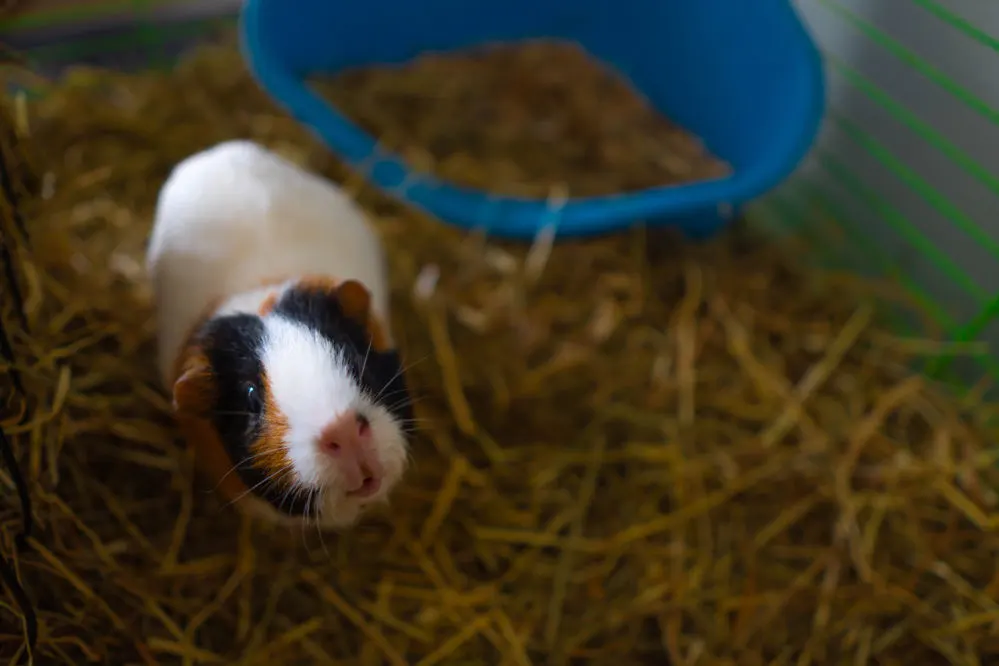
Lastly, reduced activity following excessive coughing means something is wrong. Respiratory problems usually lead to a reduction in lung capacity. More frequent breaks are needed in between activities as less oxygen is pumped into the body.
3. Eating or drinking too quickly
Coughing is a common problem in guinea pigs that can occur when they eat and drink too quickly. This happens when their delicate respiratory system gets overwhelmed by the speed at which they guzzle food and water. In turn, this obstructs their windpipe, and they’ll respond by trying to cough out the excess food.
This is a case of coughing that isn’t too serious as it’s easily observable and treatable. And fortunately, some changes to your guinea pig’s environment and routine can make all the difference.
Start by ensuring they have plenty of good quality hay and water available. This helps slow their eating and drinking as they must take breaks to sort through it for good bits.
Also, feeder devices such as hay racks and scatter feeders can help regulate their eating habits. Finally, providing them with separate dishes for food and water can incentivize fewer gulps per sip or bite. All of these steps will help ease your guinea pig’s coughing episodes and give them better overall health.
4. Allergies/ Irritations
Guinea pigs are beloved pets, but not all guinea pigs are the same, and some can have unique allergies. Just like humans, guinea pigs can develop allergic reactions to various things. These allergies can present themselves through a variety of symptoms, one of which includes coughing.
Common allergies that guinea pigs can be prone to include dust mites, pollen, dusty hay or grasses, and straw shavings. They can also be allergic to certain types of bedding material, such as cedarwood or sawdust.
Guinea pig parents will also have to be careful about the cleaning products they use in proximity to the critter’s cage. For example, if you keep them in your room on a table regularly cleaned using a specific product.
Furthermore, you may notice your guinea pig cough when you or someone else picks them up. This may be because they’re allergic to the perfume or lotion you’re wearing. Strong scents, like cologne and air fresheners, can trigger their allergies.
5. Foreign objects in the throat
It’s no fun when an animal is not well, especially when their ailments are mysterious and don’t fit any of the above causes. This may be due to a foreign object being stuck in their throats or nasal passages and restricting their airways.
If you’ve noticed that your guinea pig’s consistent coughing is caused by a foreign object stuck in its throat, you should take it to the vet. Guinea pigs often pick up small objects such as paper clips or other objects with their mouths and end up choking on them or having difficulty swallowing.
This may lead to frequent coughing as they try to pass the object out.
How to tell when a guinea pig cough is serious
As explained above, there are various reasons behind guinea pigs coughing, but how can you tell when it’s a severe cough? Multiple ways can help you identify a health issue with your furry friend.
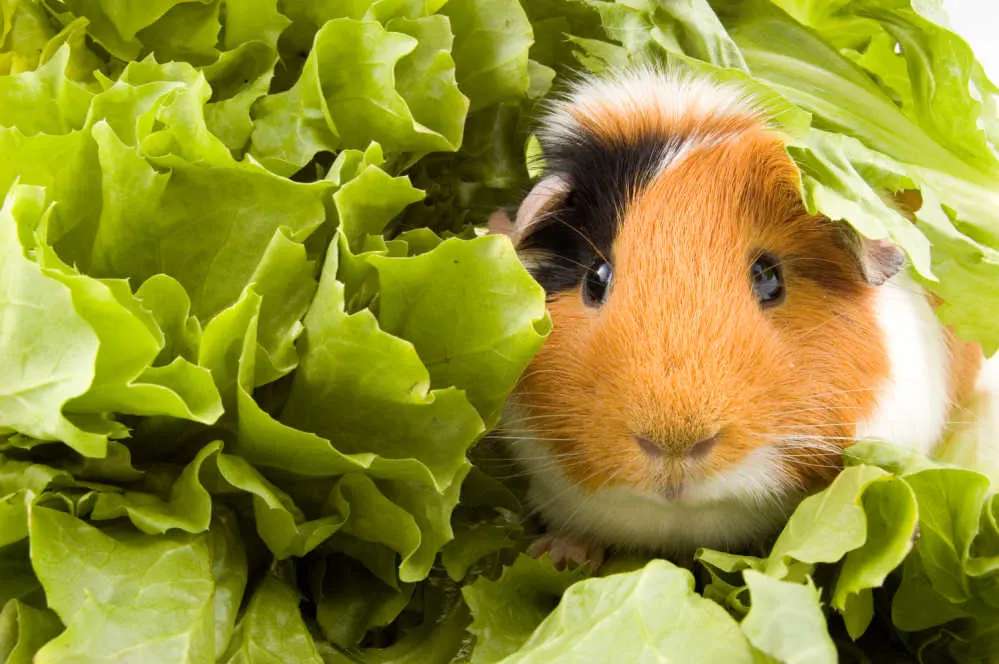
Since guinea pigs occasionally cough throughout the day, frequent coughing between short periods is a telltale sign that something is wrong. This is even more important if the coughs start without any prompting from them eating or drinking anything.
Coughs accompanied by breathing difficulties, lethargy, breathing too quickly, and discharge from the nose and mouth are serious. If your guinea pig finds it hard to eat or drink in between coughing, that is serious too.
As these are all gauged via observation, you’ll need to be eagle-eyed in observing this adorable critter and identify a serious illness. If you don’t, there’s a risk they may die, as URIs can be fatal when they go untreated.
How to treat a coughing guinea pig
As many causes lead to a guinea pig coughing, there are just as many treatments.
Treating URIs in guinea pigs
Since upper respiratory infections are the leading causes of constant coughing in guinea pigs, treating them is of utmost importance since they can be fatal. Whether you’ve self-diagnosed or had the vet help diagnose your cute little friend, you have to do the following to treat them.
Antibiotics
When the vet finds out that URIs are behind your guinea pig’s sickness, they’ll likely prescribe antibiotic treatment. These will be given based on the type of bacteria affecting your guinea pig. They will need to consume these all the way through to ensure all bacteria and infections are eliminated.
Unfortunately, your cavy probably won’t be too receptive to pill antibiotics. Ask the vet for liquid antibiotics that could be given using medicine droppers to drop it on their favorite treats and food.
Vitamins
Vitamins are necessary for helping cavies deal with URIs, with vitamin C being particularly effective. However, guinea pigs can’t create vitamin C themselves. Therefore, they’ll need vitamin C supplements.
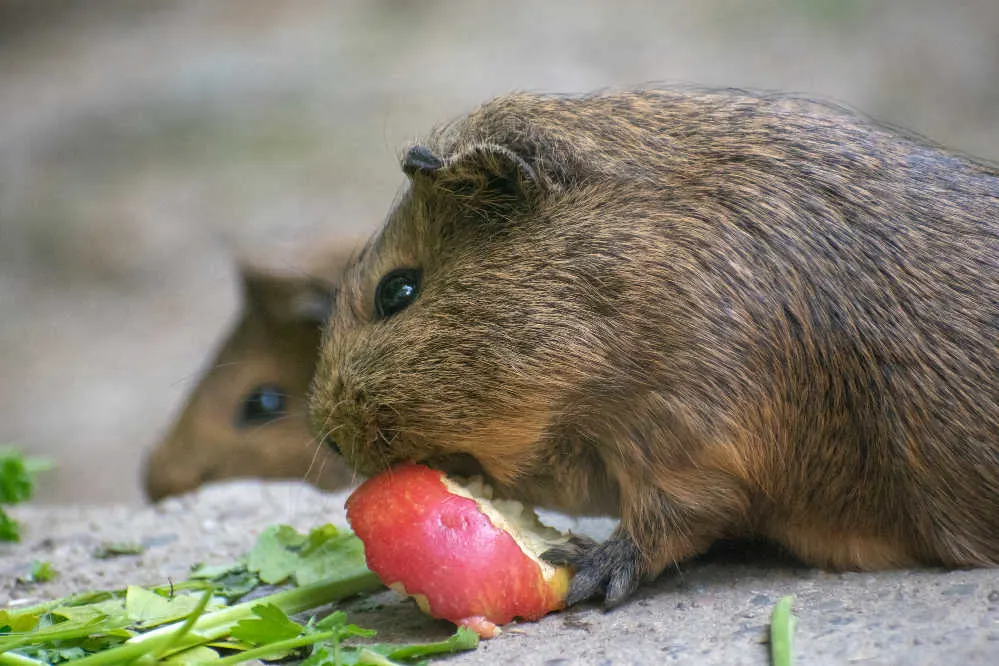
So, you’ll need to give them vitamin C-rich foods like green peppers, broccoli, citrus fruits, and vitamin C pellets. These should, however, be provided in the correct amount, and your veterinarian will best let you know how much to administer.
Monitor them
After the vet visits and supplying them with antibiotics and vitamin C, you’ll need to monitor your cavy regularly. This is because certain antibiotics may not agree with your critter, leading to a lack of improvement. If this is the case, you’ll need to alert the vet, and they may change the antibiotics given to your cavy.
Further, a more detailed diagnosis may be needed, including a chest x-ray.
Unfortunately, some cavies still suffer fatal illnesses even with all the antibiotics and vitamins given to them. So, this is something you should prepare for.
How to prevent guinea pig coughs
As we all know, prevention is more effective than treatment. There can’t be any illnesses that affect your lovable cavy if you don’t give it a chance to start with.
Proper ventilation
The health of your guinea pigs depends on a clean environment and well-ventilated cage. Your cavy can suffer from respiratory disease and other health problems without proper ventilation.
Proper ventilation allows air to move freely through the cage and keeps it at an optimal temperature to keep your pets healthy and comfortable. Make sure there is enough space in the cage for good air circulation.
Adding a fan can help generate more airflow as well. Talk to your veterinarian to determine the best ventilation system for your specific setup.
Separate your guinea pigs
As you already know, URIs are contagious between cavies and don’t require direct contact. That’s why it’s essential to keep two guinea pigs separate if one is showing signs of sickness and give them enough space in a cage, as this can make significant differences to their health.
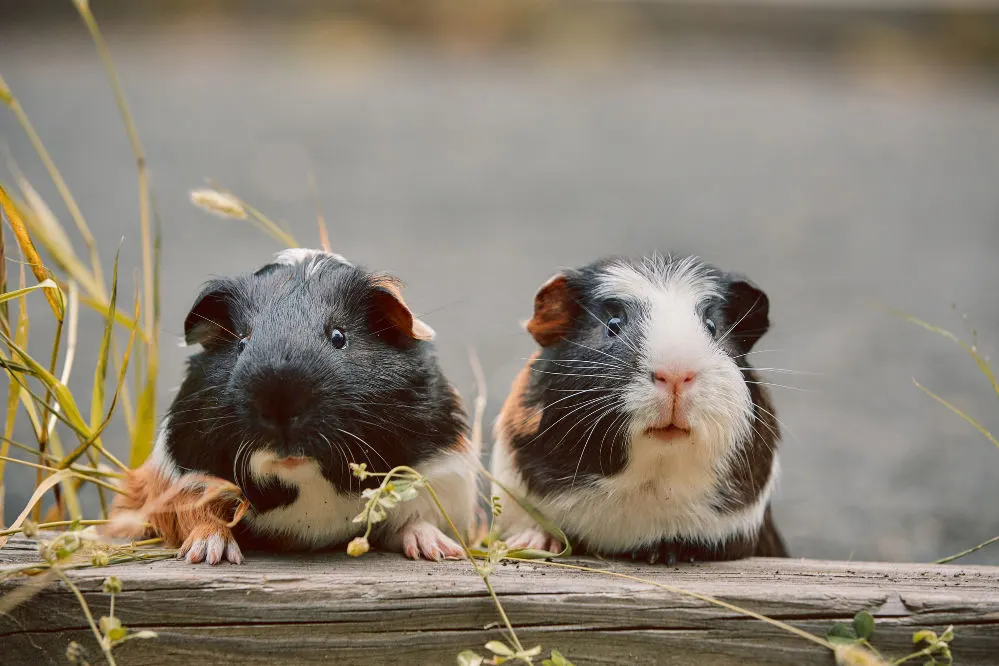
If you have two of them in a small cage, they may develop an illness due to overcrowding. This leads to distress, weakening their immune systems and making them susceptible to URIs.
When you want to keep two cavies in the same cage, opt for a large one that measures at least 30 x 50 inches. This should be enough to give them adequate space to move around freely.
Keep them away from rabbits and dogs
We love all pets, big or small. As such, it’s not uncommon to have cavies and a few other pets, be it dogs, rabbits, cats, or birds.
However, it’s essential to take certain precautions to ensure the safety of your smallest friend. If you own a rabbit or a dog, you’ll need to keep them away from the guinea pigs.
Keeping dogs and rabbits away from guinea pigs is essential to protect their health. Both animals carry diseases like URIs that can be fatal for guinea pigs. Keeping them separated and monitored whenever they’re in the same area can help reduce the risk of any potential harm.
Plus, most rabbit breeds and dogs are big compared to guinea pigs, and attempts to play with them can lead to injuries. For example, an excited big dog’s tail can whack the cage onto the floor.
Choose appropriate bedding
Bedding for guinea pigs should be non-toxic, comfortable, and absorbent. The best options there include wood shavings, paper and fleece.
Wood shavings offer excellent cushioning, but you should avoid cedar as it carries certain toxins harmful to small animals. Fleece makes a great reusable, soft and hygienic option, and paper is easily disposed of, soft, and absorbent. Check out this handy guide to learn how to set up a guinea pig cage with fleece.
Hay can also make an excellent bedding material because it’s soft and helps trim nails, as your piggie uses it for nesting. However, hay dust is an actual thing you’ll need to be wary of.
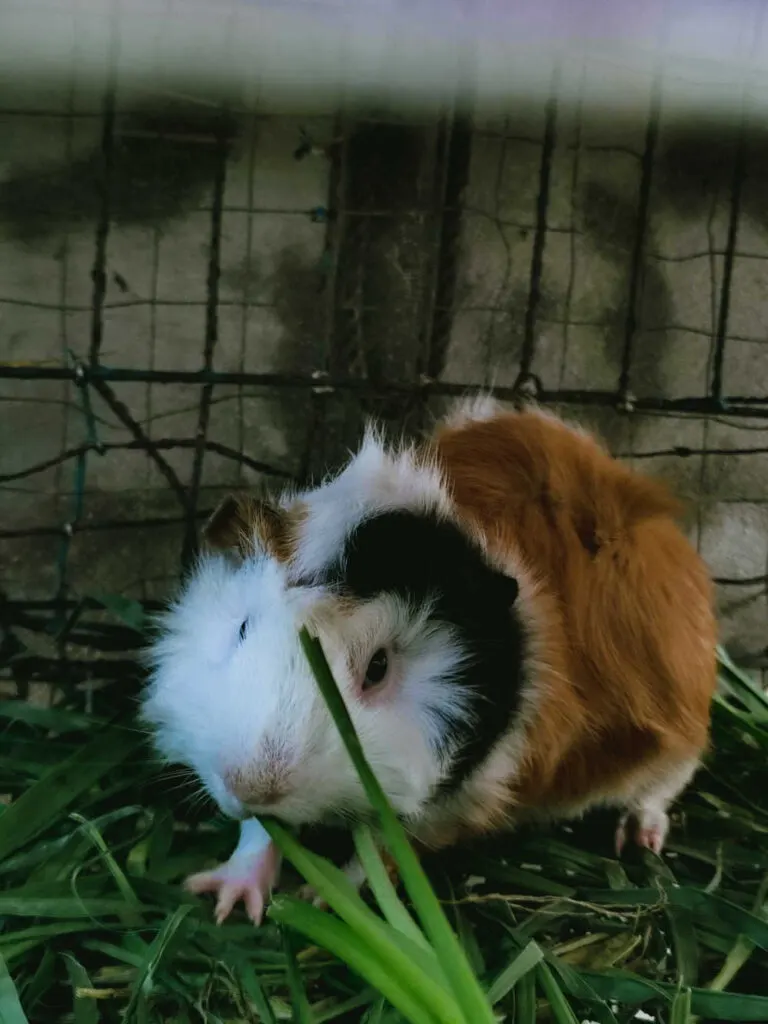
The grass is also viable because of its natural look and feel. Another good type of bedding is a fleece liner — check out this handy guide to learn how to set up a guinea pig cage with fleece.
When either option becomes damp, remove it before it becomes moldy and becomes a breeding ground for infections.
When introducing any new bedding material into the habitat of your guinea pig, always double-check the dust levels before bringing them into contact with the new material.
Clean the cage regularly
Caring for guinea pigs can be a rewarding experience, but maintaining their habitat is key to having a healthy pet. Cleaning their cage should be done at least once a week. This ensures that the space remains sanitary and safe for your furry friend.
This involves scrubbing down all surfaces of the cage with warm soapy water. You’ll also need to change any bedding or litter that needs to be replaced.
When sick or having just recovered, clean more regularly as their immune system would still be a little weak. This is particularly important for young guinea pigs who aren’t as strong. Cleaning their spaces is a great way to bond with your lovely cavy.
Ensure they get enough vitamin C
As already discussed, vitamin C is crucial in treating URIs. An adequate supply is also great for dealing with vitamin C deficiency and preventing these illnesses.
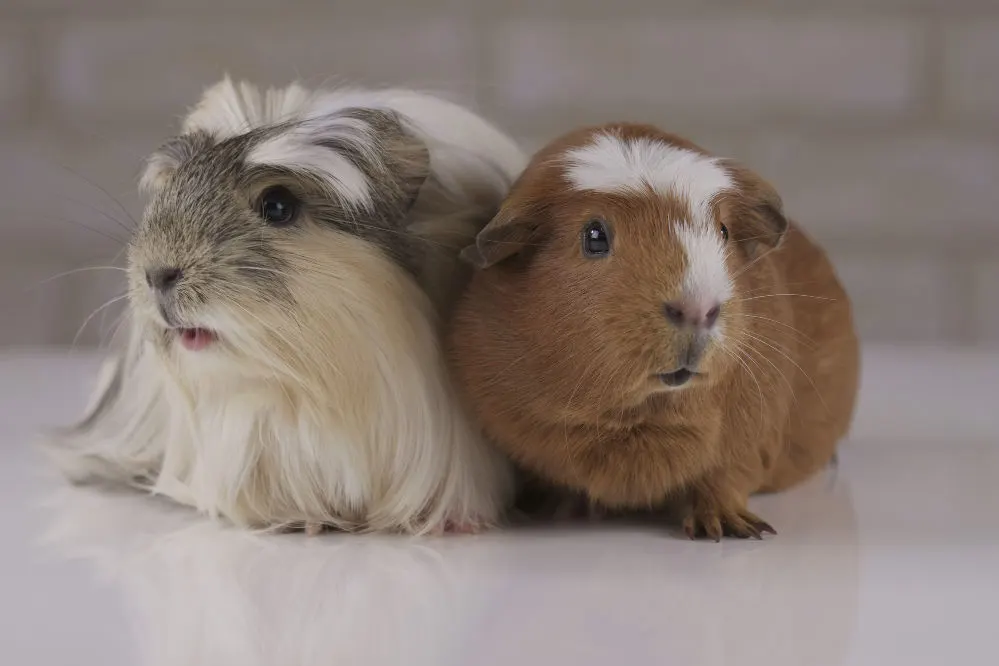
Common foods high in vitamin C and suitable for cavies include parsley, mustard greens, bell peppers, and citrus fruits. As always, these should be given in moderate amounts.
You can also feed them vitamin C pellets, although these don’t last very long due to their quick oxidation time.
Avoid scented products
Taking care of guinea pigs can be a rewarding experience, but it’s important to remember that many products may not be suited for them. This includes products made specifically for them or things you use on yourself or the household.
Whether using shampoo, litter, sprays, or bedding, your furry friends may have difficulty tolerating fragranced products. The pungent smells from these items can irritate guinea pigs’ respiratory tracts and eyes. This can also trigger their allergies.
Opt for unscented products to keep your pet safe and healthy whenever possible. If you’re wearing strong cologne, it’s best to stay away from them until it’s worn off.
Slice treats into manageable sizes
Unfortunately, when left to regulate themselves, guinea pigs will almost always overeat or eat too quickly. This may lead to the coughing described above. And while you shouldn’t be alarmed at coughing while eating or drinking, we doubt anyone wants to see their adorable critters go through even the slightest discomfort.
In addition to providing plenty of hay and water, you’ll also need to give them treats (like vitamin C-rich foods) in manageable sizes. You’ll need to cut these into smaller sizes to prevent choking and related issues.
Regular vet visits
Regular vet visits for your guinea pig are vital to keeping them healthy and happy. They’re small animals, so catching potential health problems early is critical for guinea pig owners.
Preventative care at regular check-ups can help identify respiratory issues before they become more serious. This allows you to catch and treat them while they’re still in their early stages.
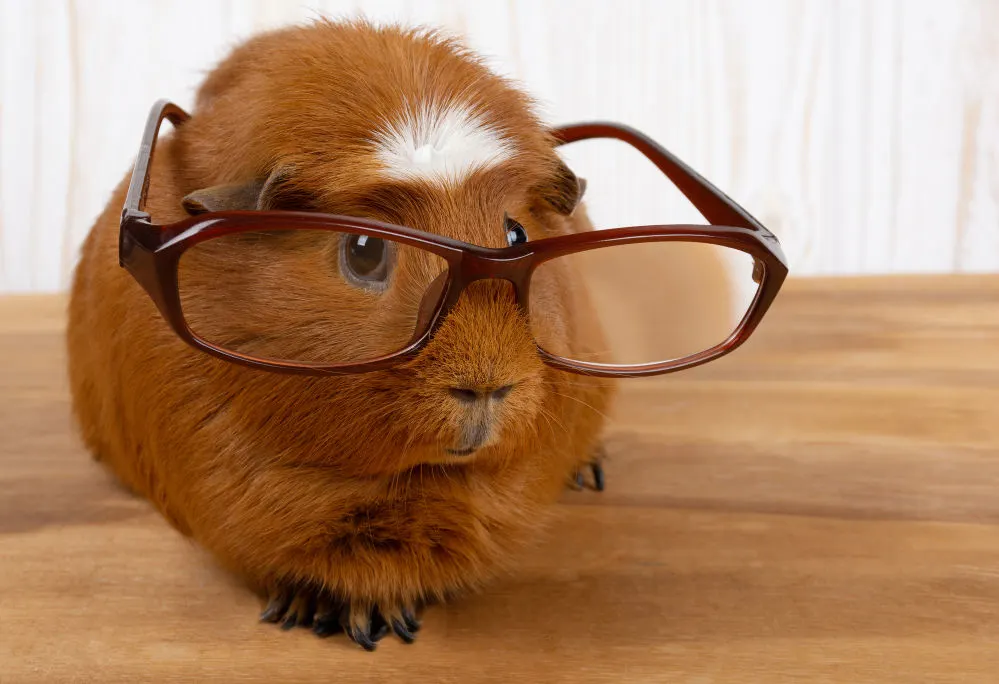
Since upper respiratory infections can have debilitating effects on your little friend, vet visits are the best way to catch them before they develop further. As soon as you see potential issues, head to the veterinarian.
Final thoughts on your guinea pig coughing
So, there you have it: the next time your guinea pig starts hacking away, you’ll have a good idea of what’s wrong. Be sure to take proper care of their respiratory system by cleaning their cage often and checking for any common symptoms, and always take your pet to the vet if they seem sick.
Now, you should be ready to deal with a coughing little friend!
Steph Dyson is a travel journalist by trade but a lover of all small pets. She’s been a pet mum to everything from gerbils to guinea pigs, rabbits to hamsters, and fish to dogs of all shapes and sizes. She wants to share her years of experience with small pets and make Small Pet Guides the go-to website for pet owners seeking information and care advice.

